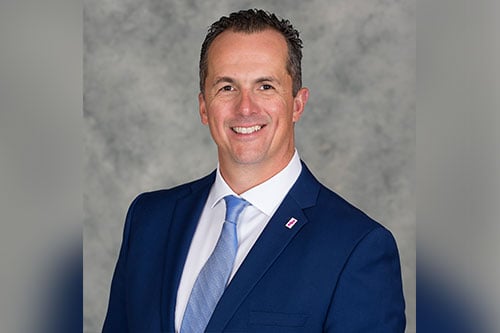

When Kent Rowe stepped into the role of president at the Insurance Brokers Association of Canada (IBAC) in September 2019, he didn’t know he would be helping to lead the organization during one of the most significant global events in recent history. While the pandemic has put some projects on hold, it certainly hasn’t stopped the IBAC leadership team from accomplishing several key projects over the course of this tumultuous year.
“Technology is definitely one [area] where we think we’ve made significant progress with our data exchange project, and trying to create an environment where there’s real-time interaction between insurers and brokers,” said Rowe (pictured), who is also the VP for Wedgwood Insurance/Magnes Group. “We’ve developed many partnerships with insurers, BMS vendors, and other stakeholders to progress that file and have several insurers now that are using the CISO repository for real-time transactions for First Notice of Loss, billing inquiry, and claims inquiry.”
In addition to focusing on data exchange, IBAC has also been able to improve its profile as an advocate for the broking industry and insurance consumers over recent years – and this work hasn’t stopped over the course of 2019-2020. While the association wasn’t able to hold its annual Hill Day in Ottawa this year – when brokers converge on Parliament Hill and meet with dozens of senators and MPs to convey the message of advocacy and the work brokers do for Canadian insurance consumers across the country – IBAC has found other avenues to offer value from an advocacy perspective.
“One of the greater accomplishments over the last year is that people are reaching out to us now for our position on issues relating to public interest matters proactively, versus us having to go to them,” explained Rowe. A few examples of issues where this has happened have included distracted driving, as well as the legalization of cannabis and the impact on the insurance industry.
Added Rowe, “Government officials and bureaucrats have reached out to us for our opinion on those issues [and] I think that speaks to the level of respect that brokers have within that space, and the good work that we’ve done in positioning ourselves as consumer advocates.”
On the natural catastrophe front, IBAC has likewise been busy, specifically in developing awareness about key disasters that pose serious risk to consumers. In April 2020, the Intact Centre on Climate Adaptation revealed that it had collaborated with IBAC on the development of a new online broker training course entitled, “Helping your Clients to Protect their Homes from Flooding.”
The topic of flood has been an important one for the insurance industry over recent years and came up again this year with the flooding and hailstorm event in Calgary and the looming active hurricane season that experts are predicting for 2020.
“It’s become more and more of a public issue, and it’s happening with more and more frequency, so the promotion of the Intact Centre was a key step in terms of providing that level of education for brokers across the country – enabling them to understand the risks of their clients better and how to work with clients to help mitigate loss,” said Rowe.
Earthquakes have also held IBAC’s attention, and the association has been meeting with politicians to create awareness about the risk. In 2019, IBAC launched ‘The Big If’ campaign to create awareness of the risks Canadians face with respect to flood and earthquake, and to reinvigorate conversations with brokers and customers about making sure people are protected against those perils.
“A large percentage of Canadians don’t have earthquake coverage, particularly in hotspots like Vancouver, Ottawa and Montreal,” said Rowe, “so we’re actively engaging in conversations with customers and stakeholders.”
These and many other risks will continue to hold the attention of the insurance industry and the broking association in particular over the coming years, especially considering the challenges that the pandemic has brought forward. How insurers are going to deal with business interruption, cyber liability, directors’ and officers’ liability, and general liability wordings post-COVID are a few areas of concern.
“A couple of years ago when overland water was starting to be covered by insurers, it was difficult to get consistency in wording. One insurer may offer one type of coverage and one insurer may exclude it,” said Rowe, adding that this could be a similar situation with pandemic-related coverage, speaking specifically to GL liability.
“It’s incumbent upon brokers to have a solid understanding of what each of their insurer partners offers … Some insurers have already moved to exclude liability associated with the spread of disease and related to the pandemic [while] others haven’t, so I think that’s something we’re going to have to keep our eye on and make sure that we’re on top of.”
